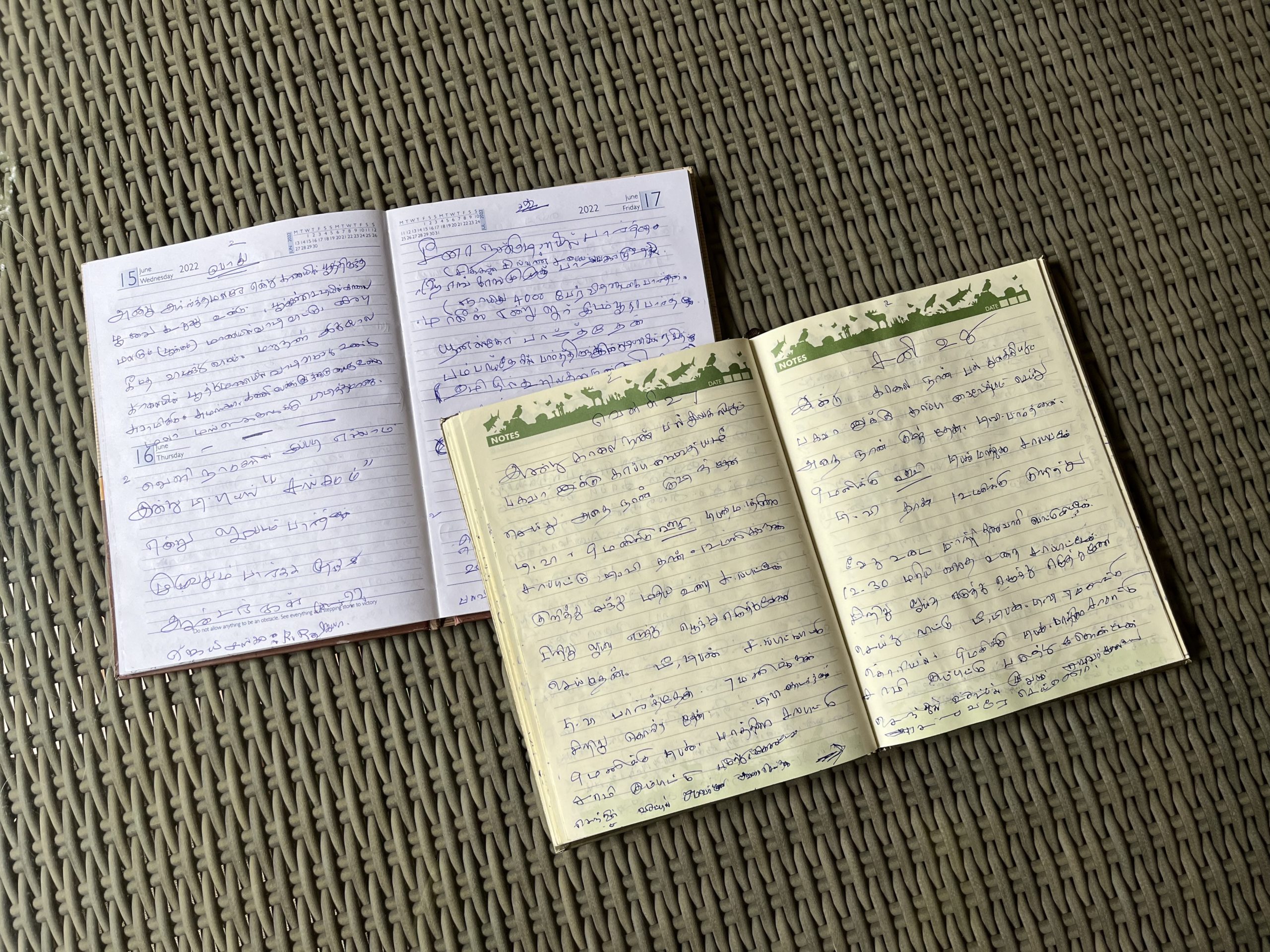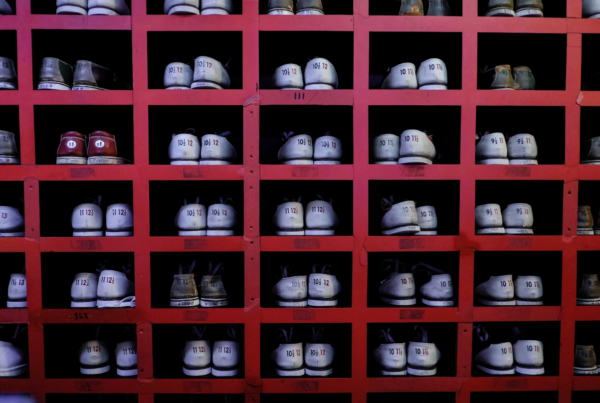
It often feels like each time I visit my extended family in India, something has inevitably changed since the previous trip: cousins growing taller than me, furniture moving around in my childhood home, several additions to the family, and some goodbyes along the way too. However, one of the few things which has never changed is the sight of my now 83 year old grandmother writing in her diary every single afternoon, like clockwork, which is a habit she has maintained for the larger part of her life. Her declarative memory and sense of self is still sharp – a coincidence? Or is there benefit of regular reflections about herself and her surroundings?
It often feels like each time I visit my extended family in India, something has inevitably changed since the previous trip: cousins growing taller than me, furniture moving around in my childhood home, several additions to the family, and some goodbyes along the way too. However, one of the few things which has never changed is the sight of my now 83 year old grandmother writing in her diary every single afternoon, like clockwork, which is a habit she has maintained for the larger part of her life. Her declarative memory and sense of self is still sharp – a coincidence? Or is there benefit of regular reflections about herself and her surroundings?

Photo by Avanti Vijay

Photo by Avanti Vijay
A diary is ‘a place where you record events, experiences, and other personal things that interest you’ (Penzu, n.d.). An individual is free to write about anything they want in their diary, as it is a space which holds no criticism or judgment. There are several different things people write about in their diary, with some of the most common being a recount of their day, goals, what they dreamt of, things they are grateful for, places they want to visit, and tracking their to-do list. Regardless of what the purpose of the diary is, there is a common denominator that ties them all together: reflection. The act of reflecting on your day, goals, dreams, feelings, future, and agenda through the form of regular journaling has been shown to help decrease anxiety (University of Rochester Medical Center, n.d.), increase working memory (Kaiser Permanente, 2020), and increase positivity (Davis, n.d.).
Diary writing reduces stress and anxiety because writing is a healthy way of tackling emotions that are overwhelming (University of Rochester Medical Center, n.d.). This occurs as an individual is able to pinpoint what is causing them to feel negatively in the moment, and consequently they are able to work towards resolving the problem and hence reduce stress levels. Using expressive writing as a way to reduce stress has been applied in a high school setting by Ramirez and Beilock (2011). High school students were randomly assigned to either the experimental group or the control group. The experimental group was asked to expressively write about their concerns and worries regarding a high stress exam 10 minutes prior to the start. In comparison, the control group was asked to write about what questions they thought were going to be on the same high stress exam 10 minutes prior to the start. Findings demonstrate that those in the expressive writing group (who wrote about their feelings) had significantly better results than those in the control group (who only reflected about the exam content). Furthermore, individuals who self-identified as suffering from test anxiety especially benefited from the expressive writing. Similar findings have also been seen in a hospital setting with patients who suffered from chronic illnesses (a demographic more prone to be stressed). Patients in the experimental condition, who were asked to write about their feelings and thoughts for 15 minutes, 3 days a week, for 12 weeks, reported less perceived stress compared to patients in the control condition, who did not partake in the diary writing (Tams, 2020).
I have also noticed that my grandmother has the tendency to ruminate through her writing for longer periods when she is experiencing more stress in her life, which ultimately results in a more thought out evaluation of the situation and greater inner peace for her. Essentially, writing while you are stressed is a form of ranting (and who does not feel better after a good rant?). The only difference is that no one ‘hears’ it but the paper. In fact, participants who were asked to write about a recent negative life experience twice a week for 2 weeks displayed a reduction in negative emotion and an increase in positive emotion right after the writing session (Chang et al., 2012), showing the more immediate effect of journaling.
Furthermore, diary writing can improve working memory as a result of the decrease on an individual’s cognitive load (Carpenter, 2001). This occurs because of the reduction of intrusive and avoidant thoughts which have been addressed by writing about them. Support for this comes from a study which was able to demonstrate that writing allows individuals to unlock feelings and thoughts that they could be disregarding (Travers, 2011). Additionally, forming memories occurs in 3 stages: acquisition, consolidation, and recall (Ellenbogen et al., 2006). Writing in a diary plays a key role in the consolidation stage, as it forces you to remember and recall the details of what has happened, which in turn helps to consolidate the information. And of course, having a written record aids in remembering information better. Research also shows that consolidation of the information received in the acquisition stage is strengthened during sleep due to slow-wave sleep (Katie Leamon, n.d.). Journalling aids this process by allowing the written information to be more accessible, especially if done right before going to bed.
“Neurologically speaking, a gratitude writing intervention is associated with significant lasting neural sensitivity to gratitude”
Lastly, writing in a diary increases overall positivity, particularly in individuals who keep a gratitude journal. A gratitude journal is a form of diary writing where a person specifically keeps track of the things that they are grateful for. This has a range of beneficial impacts, not only for the individual because it influences them to think more positively, but also for those around them because they are appreciated more (Davis, n.d.). This past summer was the first time I saw my grandmother in three years due to Covid-19 related travel restrictions. While she was the same person I have always known in a lot of ways, physically she had become weaker. I offered to cut her nails for her and she immediately pulled out her diary to note it down once I was finished. She thanked me several times for that small action in the following days. Neurologically speaking, a gratitude writing intervention is associated with significant lasting neural sensitivity to gratitude (Neurohealth Associates, 2020). This is possible because gratitude increases the activity in the anterior cingulate cortex, medial prefrontal cortex, and the hypothalamus. These areas are linked with moral and social cognition, empathy, value judgment, and emotional responses, leading to overall positivity. To conclude, research shows strong support for the notion that keeping a diary has tangible benefits on your life.
As I wrote this piece, I was reminded of all the times in the past that I have tried to keep a diary and not succeeded. My biggest reason for not maintaining it was I needed everything to be perfect, because that was my perception of what a diary looked like. The content had to be substantial, my handwriting could not be sloppy, missing even one day was not okay, and so on and so forth. My diary lost its actual purpose, to be whatever I needed it to be at any given moment. I know I am probably not the only one who has struggled with being consistent or figuring out what to write about, and I hope that if you take one thing away from this piece it is this: your diary is whatever you want it to be and you can choose how you want it to look to make it work best for you. No one else is reading what you write about and, a lot of the time, you probably will not revisit most of the pages. My grandmother does not – unless she is remembering a really good memory or looking for evidence to win an argument!
I cannot begin to tell you how excited I am for my next trip to India and seeing everyone again. I wonder what things have changed this time, hopefully nothing drastic. Regardless, I know I am promised the sight of my grandmother hunched over her diary and the sound of her pen scratching away in Tamil to look forward to.
Till next time,
Avanti <<
References
– Carpenter, S. (2001, September). A new reason for keeping a diary. American Psychological Association. Retrieved October 5, 2022, from https://www.apa.org/monitor/sep01/keepdiary
– Chang, J.-H., Huang, C.-L., & Lin, Y.-C. (2012). The psychological displacement paradigm in diary-writing (PDPD) and its psychological benefits. Journal of Happiness Studies, 14(1), 155-167. https://doi.org/10.1007/s10902-012-9321-y
– Davis, T. (n.d.). Gratitude journal: Examples, ideas, and strategies. Berkeley Well-Being Institute. Retrieved October 5, 2022, from https://www.berkeleywellbeing.com/gratitude-journal.html
– Ellenbogen, J. M., Payne, J. D., & Stickgold, R. (2006). The role of sleep in declarative memory consolidation: Passive, permissive, active or none? Current Opinion in Neurobiology, 16(6), 716-722. https://doi.org/10.1016/j.conb.2006.10.006
– Is writing a diary good for your memory? (n.d.). Katie Leamon. Retrieved October 5, 2022, from https://katieleamon.com/articles/is-writing-a-diary-good-for-your-memory/#:~:text=Writing%20A%20Diary%20Reinforces%20The%20Memory%20During%20Sleep&text=However%2C%20writing%20a%20diary%20encourages,information%20at%20a%20later%20date
– Journaling for mental health. (n.d.). University of Rochester Medical Center. Retrieved October 5, 2022, from https://www.urmc.rochester.edu/encyclopedia/content.aspx?ContentID=4552&ContentTypeID=1
– Neuroscience reveals: Gratitude literally rewires your brain to be happier. (2020, July 4). Neurohealth Associates. Retrieved October 5, 2022, from https://nhahealth.com/neuroscience-reveals-gratitude-literally-rewires-your-brain-to-be-happier/
– Ramirez, G., & Beilock, S. L. (2011). Writing about testing worries boosts exam performance in the classroom. Science, 331(6014), 211-213. https://doi.org/10.1126/science.1199427
– Tams, L. (2020, November 11). Journaling to reduce COVID-19 stress. Michigan State University. Retrieved October 5, 2022, from https://www.canr.msu.edu/news/journaling_to_reduce_stress#:~:text=Journaling%20can%20reduce%20stress%20by,self%2Ddoubt%20before%20test%20taking
– Travers, C. (2011). Unveiling a reflective diary methodology for exploring the lived experiences of stress and coping. Journal of Vocational Behavior, 79(1), 204-216. https://doi.org/10.1016/j.jvb.2010.11.007
– What is a diary and why should I keep one? (n.d.). Penzu. Retrieved October 5, 2022, from https://penzu.com/what-is-a-diary
– Why everyone should keep a journal — 7 surprising benefits. (2020, March 24). Kaiser Permanente. Retrieved October 5, 2022, from https://healthy.kaiserpermanente.org/health-wellness/healtharticle.7-benefits-of-keeping-a-journal
A diary is ‘a place where you record events, experiences, and other personal things that interest you’ (Penzu, n.d.). An individual is free to write about anything they want in their diary, as it is a space which holds no criticism or judgment. There are several different things people write about in their diary, with some of the most common being a recount of their day, goals, what they dreamt of, things they are grateful for, places they want to visit, and tracking their to-do list. Regardless of what the purpose of the diary is, there is a common denominator that ties them all together: reflection. The act of reflecting on your day, goals, dreams, feelings, future, and agenda through the form of regular journaling has been shown to help decrease anxiety (University of Rochester Medical Center, n.d.), increase working memory (Kaiser Permanente, 2020), and increase positivity (Davis, n.d.).
Diary writing reduces stress and anxiety because writing is a healthy way of tackling emotions that are overwhelming (University of Rochester Medical Center, n.d.). This occurs as an individual is able to pinpoint what is causing them to feel negatively in the moment, and consequently they are able to work towards resolving the problem and hence reduce stress levels. Using expressive writing as a way to reduce stress has been applied in a high school setting by Ramirez and Beilock (2011). High school students were randomly assigned to either the experimental group or the control group. The experimental group was asked to expressively write about their concerns and worries regarding a high stress exam 10 minutes prior to the start. In comparison, the control group was asked to write about what questions they thought were going to be on the same high stress exam 10 minutes prior to the start. Findings demonstrate that those in the expressive writing group (who wrote about their feelings) had significantly better results than those in the control group (who only reflected about the exam content). Furthermore, individuals who self-identified as suffering from test anxiety especially benefited from the expressive writing. Similar findings have also been seen in a hospital setting with patients who suffered from chronic illnesses (a demographic more prone to be stressed). Patients in the experimental condition, who were asked to write about their feelings and thoughts for 15 minutes, 3 days a week, for 12 weeks, reported less perceived stress compared to patients in the control condition, who did not partake in the diary writing (Tams, 2020).
I have also noticed that my grandmother has the tendency to ruminate through her writing for longer periods when she is experiencing more stress in her life, which ultimately results in a more thought out evaluation of the situation and greater inner peace for her. Essentially, writing while you are stressed is a form of ranting (and who does not feel better after a good rant?). The only difference is that no one ‘hears’ it but the paper. In fact, participants who were asked to write about a recent negative life experience twice a week for 2 weeks displayed a reduction in negative emotion and an increase in positive emotion right after the writing session (Chang et al., 2012), showing the more immediate effect of journaling.
Furthermore, diary writing can improve working memory as a result of the decrease on an individual’s cognitive load (Carpenter, 2001). This occurs because of the reduction of intrusive and avoidant thoughts which have been addressed by writing about them. Support for this comes from a study which was able to demonstrate that writing allows individuals to unlock feelings and thoughts that they could be disregarding (Travers, 2011). Additionally, forming memories occurs in 3 stages: acquisition, consolidation, and recall (Ellenbogen et al., 2006). Writing in a diary plays a key role in the consolidation stage, as it forces you to remember and recall the details of what has happened, which in turn helps to consolidate the information. And of course, having a written record aids in remembering information better. Research also shows that consolidation of the information received in the acquisition stage is strengthened during sleep due to slow-wave sleep (Katie Leamon, n.d.). Journalling aids this process by allowing the written information to be more accessible, especially if done right before going to bed.
“Neurologically speaking, a gratitude writing intervention is associated with significant lasting neural sensitivity to gratitude”
Lastly, writing in a diary increases overall positivity, particularly in individuals who keep a gratitude journal. A gratitude journal is a form of diary writing where a person specifically keeps track of the things that they are grateful for. This has a range of beneficial impacts, not only for the individual because it influences them to think more positively, but also for those around them because they are appreciated more (Davis, n.d.). This past summer was the first time I saw my grandmother in three years due to Covid-19 related travel restrictions. While she was the same person I have always known in a lot of ways, physically she had become weaker. I offered to cut her nails for her and she immediately pulled out her diary to note it down once I was finished. She thanked me several times for that small action in the following days. Neurologically speaking, a gratitude writing intervention is associated with significant lasting neural sensitivity to gratitude (Neurohealth Associates, 2020). This is possible because gratitude increases the activity in the anterior cingulate cortex, medial prefrontal cortex, and the hypothalamus. These areas are linked with moral and social cognition, empathy, value judgment, and emotional responses, leading to overall positivity. To conclude, research shows strong support for the notion that keeping a diary has tangible benefits on your life.
As I wrote this piece, I was reminded of all the times in the past that I have tried to keep a diary and not succeeded. My biggest reason for not maintaining it was I needed everything to be perfect, because that was my perception of what a diary looked like. The content had to be substantial, my handwriting could not be sloppy, missing even one day was not okay, and so on and so forth. My diary lost its actual purpose, to be whatever I needed it to be at any given moment. I know I am probably not the only one who has struggled with being consistent or figuring out what to write about, and I hope that if you take one thing away from this piece it is this: your diary is whatever you want it to be and you can choose how you want it to look to make it work best for you. No one else is reading what you write about and, a lot of the time, you probably will not revisit most of the pages. My grandmother does not – unless she is remembering a really good memory or looking for evidence to win an argument!
I cannot begin to tell you how excited I am for my next trip to India and seeing everyone again. I wonder what things have changed this time, hopefully nothing drastic. Regardless, I know I am promised the sight of my grandmother hunched over her diary and the sound of her pen scratching away in Tamil to look forward to.
Till next time,
Avanti <<



